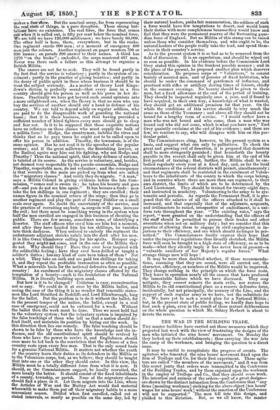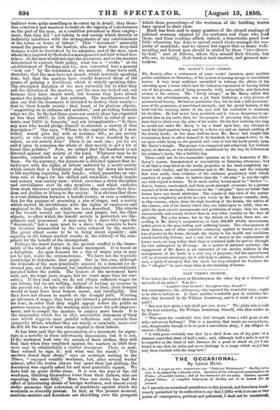THE WAR IN THE BUILDING TRADE.
TEE master builders have carried out those measures which they projected last week with the view of frustrating the designs of the men who initiated the nine hours' movement. On Monday the they locked up their establishments ; thus carrying the war into the camp of the workmen, and bringing the question to a direct issue.
It may be useful to recapitulate the progress of events. The agitators who fomented the nine hours' movement fixed upon the firm of Trollope and Co. for their first experiment. Those agita- tors are called "the members of the movement," and ft was from this secret junta that orders were transmitted to the Conference of the Building Trades, and by them enjoined upon the workmen in the employ of Trollope and Co. that they should cease work. The intention and animus of the orders—part of a great design— are shown by the distinct intimation from the Conference that any firms [meaning workmen] striking for the above object [ten hours' wages for nine hours' work] without the sanction of the Conference) will not be supported." The men fell into this design, and yielded to this dictation. But, as we all know, the master builders were quite unwilling to be eaten up in detail ; they there- fore combined and resolved to insist on the s*ning of a declaration on the part of the men, as a condition precedent to their employ- ment, that they did " not belong to any society which directly or indirectly interferes with the arrangements of any establishment or the terms or hours of labour." This " document" naturally roused the passions of the leaders, who saw that their deep-laid designs would be frustrated by its adoption, and of the men, upon whom they imposed by their clever management and half-witted doc- trines. As the men would not sign the document, and as the masters determined to execute their policy, what was a " strike" at the establishment of Troliope and Co., was converted into a general "lock out " by the resolution of the masters. Some have said, therefore, that the men have not struck, which is strictly speaking true, but that the masters have cruelly deprived them of the means of gaining a livelihood, which is strictly speaking false. The attempted dictation of the men naturally led to what they call the dictation of the masters, and the men are locked out, not because they have struck work, but because they have struck against the principles of free contract. The mouthpieces of the men say that the document is intended to destroy their society— that is, their benefit society ; they boast of its glorious objects, " supporting us in siokness and accident," and providing funerals when we die. In the last three years our society alone has expended no less than 49671. in sick allowances, 1450/. in relief of acci- dents, and 22221. in funerals," and ask triumphantly—" Is there any man who would pledge himself to abandon a society of that description?" One says, "Where is the employer who, if I were killed, would give my wife or nominee 50l., as our society would ; or who would give the 1001. if I were disabled by ac- cident, as our society does ? There is no such one ; yet we are called upon to renounce the whole of that merely to get a bit of bread that perishes." Now, we submit that the document is not directed against any society of the kind. Whatever may be its demerits, considered as a stroke of policy, that is not among them. On the contrary, the document is directed against that in- terference with the rights of labour enforced by a secret society which insists that a bricklayer shall never lay down his trowel to lift anything requiring both hands • which prescribes an 'Uni- form rate of wages for the skilled and unskilled ; which insults and annoys non-society men ; which exercises a strict discipline and surveillance over its own members ; and which excludes from work wherever practicable all those who exercise their free- dom and decline to belong to the society. It is obvious that there is a vast distinction between a benefit society, or even a combina- tion for the purpose of procuring a rise of wages, and a society which carries its interference .with the rights of employers and employed to the lengths which we have described. The objects of the benefit society are legitimate and proper, but the other objects, to effect which the benefit society is perverted, are ille- gitimate and tyrannical. A man may be a slave who signs the " document," but a man must be a slave who consents to have his faculties trammelled by the rules enforced by the society. The great object seems to be to bring about equality ; and equality in the labour market results in the robbery of the com- petent for the benefit of the incompetent. Perhaps the worst feature in the present conflict is the immo- rality of the whole of this nine hours' movement. It is based on a deception. An open demand for a rise of wages may or may not be fair, under the circumstances. We have not the requisite knowledge to determine that point. But in this case, although the demands of the men practically amount to a demand for in- creased pay, not that demand, but another, has been ostentatiously paraded before the public. The leaders of the movement have said, not, we want more wages, but we want more time for our- selves. If they had said, we do not obtain sufficient wages for our labour, but we are willing, instead of having an increase in the present rat), to take out the difference in time, their demand would at least have been honest, moral, and intelligible. But they have not chosen to march on the straight path. Wanting an advances of wages, they have put forward a pretended demand for time, in order that they might appear before the public as persons anxious to give the working man leisure for self-improve- ment, and to compel the masters to employ more hands. It is the immorality which lies in this untruthful • statement of their case which suggests most painful reflections and curtails that sympathy which, whether they act wisely or unwisely, must ever be felt for the mass of men whose capital is their labour.
It has been said that the presentation of a document for signa- ture is a novelty in these unfortunate dissensions, but it is not. If the workmen look into the annals of their strikes, they will find that when they combined against the masters in 1834 they were met by substantially a similar document. Then, as now, they refused to sign it ; and what was the result ? " The masters closed their shops," says an architect writing to the Times, " engaged country .workmen, but, after several weeks' misery, after the trades unions had spent their last shilling, the document was eagerly asked for and most gratefully signed. We have had no great strike since. It is now the sons of the old workmen, thinking themselves wiser than their fathers, who are repeating the same folly." More than one strike has had the effect of introducing shoals of foreign workmen, and almost every strike promotes that extension of machinery against which the workmen so absurdly inventors In fact, at this present moment, machine-makers and nventors are chuckling over the prospects
which these proceedings of the workmen of the building trades have opened to their view.
Much has been said in many quarters of the absurd readings of politieal economy adopted by the workmen and those who lead them, and those readings afford, indeed, a lamentable proof how little education has done to spread sound views amongst the ma- jority of mankind ; and we cannot but regret that so many well- meaning and honest men should be misled by those " two-clever- by-half " sort of fellows, whom they miscall their friends, but who are, in reality, their hardest task-masters, and grossest mis- leaders.



























 Previous page
Previous page